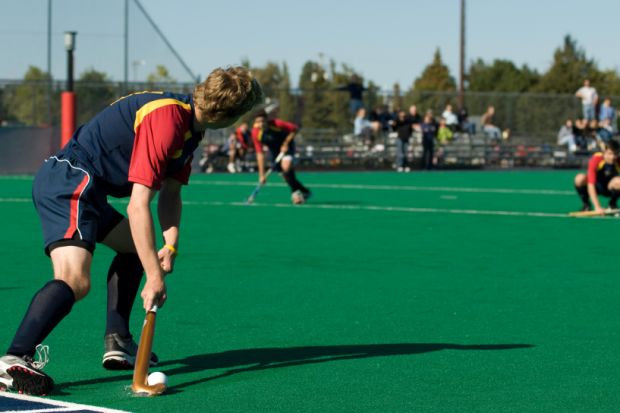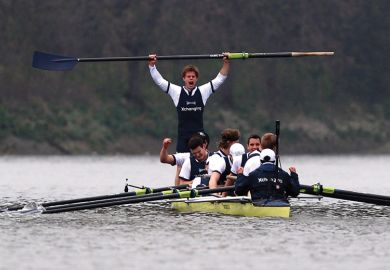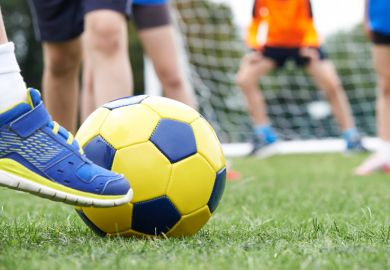It was great to read Lincoln Allison’s Times Higher Education article on the role of sport in universities. Lincoln may indeed hold a record with his 46 years playing for the University of Warwick’s staff cricket club (almost the entire period of the university’s existence), although Roger Ingham at the University of Southampton can’t be far behind. But the thrust of his article, that sport is in decline on Britain’s campuses, cannot be supported. Across Britain, sport is increasingly part of the social fabric of university life, a melting pot where, as Lincoln points out, people from different disciplines, backgrounds and cultures can interact in a mutually supportive environment. It is where elite sportspeople have the opportunity to follow a dual pathway of academic and sporting excellence and, in some cases, a second chance in both.
While Paul Jump may prefer investment in cocktail bars, for many universities, decent sporting (and indeed cultural) facilities are important in demonstrating several things to students and their families. First, that they see the time at university not just as a period of intellectual development, but rather a time when students grow as active citizens; second, that universities care about their students’ physical well-being; and third, as universities increasingly open their campuses to the community, sports facilities are great conduits to enabling local communities to feel part of the university and may even, in a small way, help to break down any remaining “town and gown” barriers.
An impressive record of provision
The UK has one of the largest university sport networks in the world, the British Universities & Colleges Sport programmes, with more than 5,500 teams taking part in competitive leagues every Wednesday afternoon in term time. It offers more than 200 sport events alongside the BUCS Nationals and BUCS Big Wednesday, which feature thousands of students competing in high quality events. BUCS Nationals this year saw a para-swimming world record and a swimming British record. Indeed, BUCS Nationals is the largest multi-sport event in the UK, with more than 6,500 students competing over three days.
Yet for those who just want a game of volleyball or five-a-side, most universities offer an intramural programme of inter-hall or inter-department competition.
Students and sport
When students arrive, the transition into university – still one of the major transitions people make in their lives – can be smoothed by participation in sport, either something the student already does or a chance to try something new, and can help to overcome the social isolation and separation anxiety that can occur when students are removed from their support networks. This sometimes results in students leaving during the initial six to eight-week period. Sports teams and the physical activity community of many gyms are a tangible group to which to belong rather than, for example, a 200-plus student lecture or academic course. Many sports teams often function as an “extended family” for students who need a support network around them. The physical activity element (gyms and exercise classes) of virtually every university is also as important as the competitive sport delivery. It holds fast to the idea of mens sana in corpore sano and provides an excellent balance to the academic and other pressures faced by today’s students. Sport can also underpin many of the other welfare services such as counselling and mental health, such as the mental health initiative run by BUCS.
In relation to the student experience, sport can teach many “soft”, “transferable” skills for employability such as teamwork, leadership, communication, negotiation, commitment, hard work. These clearly can come from academic placements and similar but, in the sport arena, they are created and led by the students themselves, not by academic staff. A BUCS report commissioned with Sheffield Hallam University’s Sport Industry Research Centre and published in 2013 on The Impact of Engagement in Sport on Graduate Employability demonstrated both higher employability and a higher earning capacity for those students who engage in sport at university compared with those who don’t and significantly higher earnings than those who don’t go to university and don’t do sport.
Breaking down the town and gown divide
The use by local communities of sports facilities supports the Universities UK strategy of “Back your Community”, which helps embed the university rather than standing outside. Staff and the external community generally are not excluded from using the facilities; in fact, they are actively encouraged. It should also be noted that universities can and do receive a significant and crucial commercial income from this facility usage as well. But university sport in the community is much more than just facility use. University sports clubs organise and lead many impressive volunteering initiatives with their local communities; for example, Loughborough University contributes more than 15,000 hours per year, and Northumbria University contributes more than 20,000 hours. Events delivered by towns and cities use both the facilities and the volunteer workforce provided by the university and student/staff populations, which contribute significantly to the cultural and economic value of the community. Whilst teams competing in BUCS are obviously restricted to students, many university teams competing in external leagues do allow non-students to compete.
Elite sport in UK higher education
At an elite level, of the five Olympic cycles between 1992 and 2008, 61 per cent of medals for Team GB came from university students and graduates. Of these, 65 per cent were gold, 66 per cent were silver and 49 per cent bronze. So, when Lincoln Allison questions if higher education is important to elite sport in the UK – yes it is. Students can and do follow a “dual career” path through university, as student and athlete, although these terms often change in terms of prioritisation during the course of their studies. A flexible approach to teaching and learning clearly helps this and is an area of possible development, especially with blended learning styles and approaches that make a university choice much more attractive to talented performers who may otherwise have thought university was not for them. For example, rugby union has found a new way for universities to support its elite programme and is investing in the academies of Premier League clubs, not only for the benefit of players’ sporting ability but also in their off-field development: consider the Wasps programme with Warwick and Coventry University. Cricket has based many of its performance centres at universities, as many players want to pursue an academic career when their cricketing career finishes.
It is unlikely that a university football team will win the FA Cup, but many people watched Ged Roddy’s Team Bath reach the first round proper in the early 2000s and, in Scotland, both the universities of Stirling and Edinburgh compete successfully in the Lowland League, one tier away from the national professional leagues.
Indeed, while it is true that elite university sport in the UK has a lower profile than that in the US, there is slow change, with the increasing profile of netball franchises at universities and a Loughborough University team in the inaugural Women’s Cricket Super League.
Add life to your student years
Sport is not something that can be done remotely or digitally. It needs to be a “lived experience” that requires an interaction by participants, affecting all their senses and potentially their lives forever. It is something that enhances both mental and physical capabilities beyond anything virtual environments can hope to achieve. Sport and physical activity may add years to your life but it will also add life to your years, student and otherwise.
Vince Mayne is chief executive of British Universities & Colleges Sport. Sir Ian Diamond is vice-chancellor of the University of Aberdeen.
Register to continue
Why register?
- Registration is free and only takes a moment
- Once registered, you can read 3 articles a month
- Sign up for our newsletter
Subscribe
Or subscribe for unlimited access to:
- Unlimited access to news, views, insights & reviews
- Digital editions
- Digital access to THE’s university and college rankings analysis
Already registered or a current subscriber?








